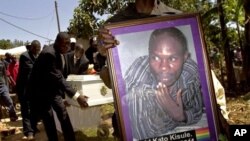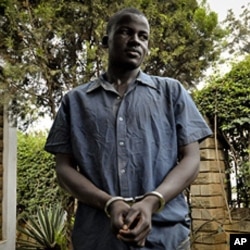A Ugandan man has been sentenced to 30 years in prison for the murder of gay rights activist David Kato. The high profile case concludes as the Ugandan parliament debates a controversial bill that would make some homosexual acts punishable by the death penalty.
The murder of gay rights activist David Kato at his home in Kampala last January focused international media attention on the plight of gays and lesbians in Uganda. Kato’s killer was sentenced Thursday to 30 years in prison for the crime, though the future for the country’s homosexual community remains difficult.
Sidney Nsubuga Enoch admitted to killing Kato with a hammer. But he was only convicted of second-degree murder, having claimed that he acted in self-defense. Enoch told the court Kato was making sexual advances, and that he had no choice but to kill him.
The conviction came shortly after the Ugandan parliament voted to re-open debate on a controversial bill that would make some homosexual acts punishable by death. The bill, which was first presented to parliament in 2009, would also make it a criminal offense to “promote” homosexuality, or to fail to turn homosexuals in to the police.
The bill has drawn intense criticism from Western governments and international human rights groups. Boris Dittrich, of the New York-based rights advocacy group Human Rights Watch, explains his organization’s position.
“The anti-homosexuality bill is a draconian law, and it needs to be defeated. It violates all kind of human rights,” he said.
Homosexuality is already illegal in Uganda, as is the case in most African countries, and can be punished by up to 14 years in prison. Public hostility to the gay and lesbian community is widespread, with many Ugandans believing that homosexuality is an anti-Christian import from the West.
Ugandan President Yoweri Museveni told reporters he refused to promote homosexual rights because it was not part of his country’s cultural traditions.
“There were a few homosexuals before colonialism which we were aware of. They were not killed, nor were they persecuted, but they were not promoted,” he said.
Kato’s murder came shortly after a local newspaper published the names and photos of several members the homosexual community, under the headline, “Hang Them.” Kato’s face was among them.
Some people blame the rise of Evangelical Christianity in Uganda for this violent homophobia.
At Kato’s funeral last January, a local priest used the occasion to rail against homosexuals, calling on them to repent or be “punished by God.”
But others blame the new bill being debated by parliament. Activist Joanitah Abang, of the lesbian rights organization Freedom and Roam, says that before the bill, homosexuals were largely left alone. But now, she says, those in the lesbian, gay, bi-sexual, transgender (LGBT) community are being accused of any number of crimes.
“Before the bill, not many Ugandans knew that there were LGBT people in Uganda. Gay people lived their lives, although there were a few instances of harassment, abuse, but it wasn’t so much like today," Abang said. "But when the bill was tabled in Parliament, it brought in a lot of issues - issues of recruiting children, issues of rape, issues of homosexuals being pedophile. It caused a lot of discussion in people’s homes, communities and workplaces.”
Even if the bill does not pass, few people expect homosexuality to be legalized in Uganda in the near future. In the mean time, many Ugandan gays and lesbians are hoping that the public attention will die down, and they will be left to slip quietly back under the radar.





